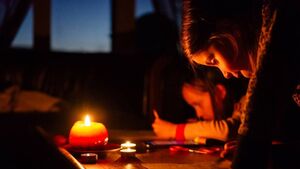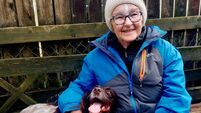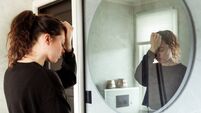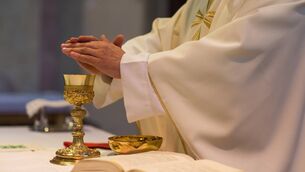Living Greener: Turn the lights off, there is no need to fear the dark

Two little girls draw on a table with a candle during a power outage
WE are coming up on the winter solstice – what the Saxons called the Mother Night – and the long darkness of winter is a reminder of how much we have come to rely on electricity.
Only a few generations ago, most people in Ireland lived without it, and a few generations before that, everyone did.
We are accustomed to, say, spending our evenings with blazing light all around us, from streetlights to headlights to shop windows to that one neighbour whose Christmas decorations can be seen from orbit. We grew up surrounded by lights too bright to look at directly, with a dozen electronic devices blinking away, never truly in darkness. We picture people before electricity behaving as we would in a power cut, perhaps banging shins against coffee tables.
Living without electricity, though, wasn’t like that for them, or for any premodern people. Rhoda Twombley, who lived on the last island to be electrified, described it in the book And Then There was Light that they ran a generator for a short time, especially in winter, but once it was turned off ‘it was as if the world stood still ... it was a pleasure to sit on the bench outside the front gate, senses heightened, to look out of the water and listen to waves gently splashing ashore. The stars shone, impossibly close and radiant, and we might be treated to an occasional shooting star and a glimpse of the Aurora Borealis … You could not feel any more surrounded by nature: far from being lonely, the feeling of being at one with our island, our little space in the universe, was life-affirming.’ Most people worked during the day and came in when it was dark, but even then people didn’t stop. Paintings from a few hundred years ago show people reading newspapers, chatting and generally celebrating, all to candles or oil lamps.
Our eyes evolved to adjust from very bright to very dark, and our brains to not notice; if you’ve ever had to adjust camera film or video for day or night, you know the change looks more extreme on video than it looked to your human eyes.
Our bodies cope with a variety of light levels as we cope with a variety of foods. Continuous brightness for a lifetime as we have today, however, might be as bad as one continuous kind of food for a lifetime.
As Heather Heying and Bret Weinstein point out in their book , most animals and plants are deeply tuned to the sun’s cycle, and modern lights play havoc with the migration of everything from birds to butterflies to eels.
It is probably also putting a subtle strain on us that we don’t notice, as we’ve never been without it. Many suffer from insomnia at home but see it vanish on camping trips, as the sun and moon re-regulate our bodies and minds.
Even a slight reduction in our sleep can ruin our day, and a few days without sleep is literal torture. Sleep disorders might be one of the most common and underappreciated health risks—the less sleep you get, the more likely you are to get infections, have heart attacks, even get breast cancer.
Too little sleep also causes mental disorders, which have skyrocketed in the decades we’ve had electric lights. For people with neurological issues like autism, extreme lights cause stress or panic attacks, and for epileptics our often flashing city lights are a constant danger.
One result of this is that almost no urban people these days – which is most people — have the connection to the stars and moon that all their ancestors, all over the world, did. Every mythology heavily features the stars because there they were all around, more of them than most of us have ever seen. We look at the same sky and see it, if at all, through a glass, darkly.
I live with electricity, especially this time of year, just as you probably do – but I’ve found I can cut far back from what I once used, and get by just fine. I also found that turning the lights off, dimming screens and quieting the world for an hour or so helps immensely in getting to sleep at night. As usual, whatever was more natural for our ancestors will probably be better for the environment, healthier for our bodies, and give us more peace of mind.





